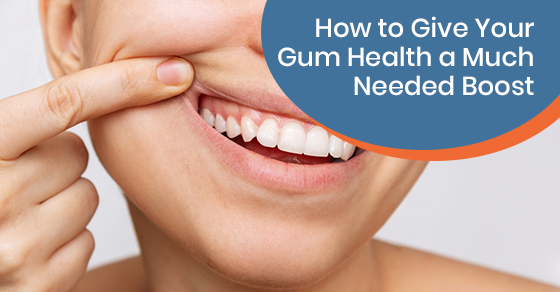Everyone wants glistening white teeth…but don’t forget about your gums! After all, there is a lot more to a healthy mouth than a bright, shiny smile.
If something is wrong with your gums, it can have devastating consequences for your smile and dental health at large. Poor gum health may indicate serious oral issues, such as gum disease.
It is thus critically important that we care for our gums. Our best defence against gum disease is proper dental hygiene.
This involves practicing good habits at home and visiting your dentist twice a year. In this article, we will discuss the nature of gum disease and seven essential ways to combat it.
Gum Disease and the Dangers of Poor Gum Health
Gum disease may develop because of poor oral habits.
When you skip regular dental appointments or neglect your dental hygiene at home, a sticky layer of bacteria called plaque builds up at the gum line.
Plaque is a natural consequence of eating and the plentiful bacteria located in the mouth. However, it’s important to remove plaque with proactive brushing and flossing.
Unremoved plaque hardens and turns into tartar. Brushing and flossing have no effect on tartar; only your dentist can remove it.
If plaque and tartar are not addressed, this concentration of bacteria can lead to gum disease. In the early stages, gum disease is called gingivitis—and it’s reversible!
Gingivitis appears as inflamed, tender, red, swollen, or bleeding gums. The bone and tissue are not affected, so there is no permanent damage. If untreated, though, gingivitis becomes periodontitis.
This is an advanced form of gum disease with serious consequences for your oral health.
With periodontitis, your gums recede, leaving pockets between the tooth and gum. Bacteria get trapped in these pockets, thus worsening the condition.
The connections between the gums, bones, and tissues can weaken. Ultimately, you can face bone loss, tooth loss, and extreme pain.
Good Brushing Techniques
You should brush your teeth twice a day or after every meal. Brushing is essential for removing the food particles and plaque that gather between your teeth and gums. Your toothbrush should have soft bristles.
You might also want to consider an electric toothbrush. These are far more effective at cleaning and plaque removal.
While brushing, hold your toothbrush at a 45-degree angle and focus on each quadrant of your mouth for 30 seconds. All in all, you should spend two minutes brushing your teeth.
Fluoride Toothpaste
When selecting a toothpaste, check if it contains fluoride. Fluoride toothpaste is more effective at combating gum disease, reducing gingivitis, freshening your breath, and preventing tooth decay.
Additionally, it’s also great for strengthening your enamel.
Don’t Forget to Floss
Flossing removes bits of food and plaque missed by brushing alone. Therefore, ensure that you floss once per day.
The time of day doesn’t matter as long as you do so regularly.
Antibacterial Mouthwash
Mouthwash is best used in conjunction with your other oral hygiene habits. It is not a replacement for brushing and flossing! However, rinsing with an antibacterial mouthwash after your evening brush is helpful.
It removes any food particles and plaque lingering in your mouth, thus preventing plaque and tartar build-up.
Quit Smoking
It should be well known that smoking is bad for your overall health, including the health of your mouth!
There is a strong connection between smoking and gum disease. As smoking weakens your immune system, it becomes that much harder for your body to combat gum infections. As well, it’s much harder for your gums to heal if damaged.
Eat Well
Your diet affects the strength and health of your gums. High-sugar foods are harmful for your oral health and can promote tooth decay.
On the other hand, foods rich in vitamins D, C, and K are particularly good for your mouth. These vitamins help to keep your teeth strong and resistant to infection.
Professional Cleanings
When it comes to gum disease, prevention is the best treatment. It’s important to visit your dentist twice per year for routine cleaning.
As tartar can only be removed by a dentist, these cleanings are invaluable. Furthermore, your dentist assesses the health of your gums and teeth during these appointments.
This allows them to catch any developing issues early, thus preventing irreversible damage to your mouth. Waiting to address dental issues is never a good idea.
Visit Your Dental Hygienist at Bloor West Smiles
Healthy gums are a key part of a healthy, vibrant life. They allow you to smile with confidence, eat without pain, and avoid tooth loss.
That’s why you should develop and maintain good dental hygiene habits! When you brush regularly, floss, use mouthwash, quit smoking, and eat well, you are fostering healthy gums and preventing gum disease.
Also, don’t forget to visit your dental hygienist! Professional cleanings and check-ups with your dentist are key for removing tartar and detecting issues before they turn into serious problems.
Prevention is always better than treatment. Ensure you visit Bloor West Smiles twice a year for a thorough cleaning and check-up!
To book a cleaning with a dental hygienist at Bloor West Smiles, call us at 416-766-2853 or contact us here.


Sorry, comments are closed for this post.